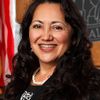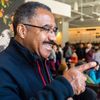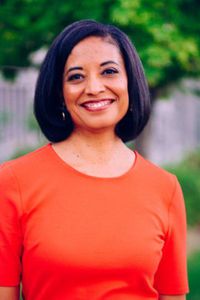Lisa Calderón (Colorado)
Lisa Calderón ran for election for Mayor of Denver in Colorado. She lost in the general election on April 4, 2023.
Biography
Calderón received a bachelor's degree at Metropolitan State University of Denver, a master's degree from the University of Denver, a law degree from the University of Colorado, and a doctorate from the University of Colorado Denver.
From 1995 to 2007, Calderón worked as a legal and social policy director at the Boulder County Safehouse. In 2004, Calderón began working as a professor at the University of Colorado Boulder, later serving on the faculty at the University of Colorado Denver and Regis University. From 2007 to 2017, Calderón was the executive director of the Community Reentry Program, and, from 2019 to 2021, was chief of staff to Denver City Councilwoman Candi CdeBaca. In 2021, Calderón became executive director of Emerge Colorado, a training program for Democratic women running for office.[1]
Elections
2023
See also: Mayoral election in Denver, Colorado (2023)
General runoff election
General runoff election for Mayor of Denver
Michael Johnston defeated Kelly Brough in the general runoff election for Mayor of Denver on June 6, 2023.
Candidate | % | Votes | ||
| ✔ |  | Michael Johnston (Nonpartisan) | 55.2 | 89,889 |
 | Kelly Brough (Nonpartisan) | 44.8 | 73,097 | |
| Total votes: 162,986 | ||||
 = candidate completed the Ballotpedia Candidate Connection survey. = candidate completed the Ballotpedia Candidate Connection survey. | ||||
| If you are a candidate and would like to tell readers and voters more about why they should vote for you, complete the Ballotpedia Candidate Connection Survey. | ||||
Do you want a spreadsheet of this type of data? Contact our sales team. | ||||
General election
General election for Mayor of Denver
The following candidates ran in the general election for Mayor of Denver on April 4, 2023.
Candidate | % | Votes | ||
| ✔ |  | Michael Johnston (Nonpartisan) | 24.5 | 42,273 |
| ✔ |  | Kelly Brough (Nonpartisan) | 20.1 | 34,627 |
 | Lisa Calderón (Nonpartisan) | 18.1 | 31,164 | |
 | Andy Rougeot (Nonpartisan)  | 11.5 | 19,927 | |
 | Leslie Herod (Nonpartisan) | 10.7 | 18,506 | |
 | Chris Hansen (Nonpartisan)  | 4.8 | 8,309 | |
 | Deborah Ortega (Nonpartisan) | 4.5 | 7,739 | |
 | Ean Tafoya (Nonpartisan)  | 1.6 | 2,700 | |
| Terrance Roberts (Nonpartisan) | 1.0 | 1,757 | ||
 | Thomas Wolf (Nonpartisan) | 1.0 | 1,747 | |
 | Trinidad Rodriguez (Nonpartisan)  | 0.7 | 1,240 | |
| Aurelio Martinez (Nonpartisan) | 0.4 | 755 | ||
 | Al Gardner (Nonpartisan) | 0.4 | 725 | |
 | James Walsh (Nonpartisan)  | 0.4 | 722 | |
| Renate Behrens (Nonpartisan) | 0.1 | 184 | ||
| Robert Treta (Nonpartisan) | 0.1 | 169 | ||
 | Abass Yaya Bamba (Nonpartisan) (Write-in)  | 0.0 | 24 | |
 | Jesse Parris (Nonpartisan) (Write-in) | 0.0 | 11 | |
 | Paul Fiorino (Nonpartisan) (Write-in) | 0.0 | 5 | |
| Matt Brady (Nonpartisan) (Write-in) | 0.0 | 4 | ||
 | Marcus Giavanni (Nonpartisan) (Write-in) | 0.0 | 1 | |
| Danny F. Lopez (Nonpartisan) (Write-in) | 0.0 | 0 | ||
| Total votes: 172,589 | ||||
 = candidate completed the Ballotpedia Candidate Connection survey. = candidate completed the Ballotpedia Candidate Connection survey. | ||||
| If you are a candidate and would like to tell readers and voters more about why they should vote for you, complete the Ballotpedia Candidate Connection Survey. | ||||
Do you want a spreadsheet of this type of data? Contact our sales team. | ||||
Withdrawn or disqualified candidates
- Sylvia Herring (Nonpartisan)
- Kwame Spearman (Nonpartisan) (Unofficially withdrew)
- Anna Burrell (Nonpartisan)
- Alex Valdez (Nonpartisan)
- Sean Gallegos (Nonpartisan)
- Kenneth Simpson (Nonpartisan)
- Alex Cowans (Nonpartisan)
- David E. Stevens (Nonpartisan)
2019
See also: Mayoral election in Denver, Colorado (2019)
General runoff election
General runoff election for Mayor of Denver
Incumbent Michael Hancock defeated Jamie Giellis in the general runoff election for Mayor of Denver on June 4, 2019.
Candidate | % | Votes | ||
| ✔ |  | Michael Hancock (Nonpartisan) | 56.3 | 91,675 |
 | Jamie Giellis (Nonpartisan) | 43.7 | 71,069 | |
| Total votes: 162,744 | ||||
 = candidate completed the Ballotpedia Candidate Connection survey. = candidate completed the Ballotpedia Candidate Connection survey. | ||||
| If you are a candidate and would like to tell readers and voters more about why they should vote for you, complete the Ballotpedia Candidate Connection Survey. | ||||
Do you want a spreadsheet of this type of data? Contact our sales team. | ||||
General election
General election for Mayor of Denver
The following candidates ran in the general election for Mayor of Denver on May 7, 2019.
Candidate | % | Votes | ||
| ✔ |  | Michael Hancock (Nonpartisan) | 38.7 | 69,271 |
| ✔ |  | Jamie Giellis (Nonpartisan) | 24.9 | 44,543 |
 | Lisa Calderón (Nonpartisan)  | 18.5 | 33,100 | |
 | Penfield Tate (Nonpartisan) | 14.7 | 26,370 | |
| Kalyn Heffernan (Nonpartisan) | 2.5 | 4,481 | ||
 | Stephan Evans (Nonpartisan) | 0.7 | 1,325 | |
 | Marcus Giavanni (Nonpartisan) (Write-in)  | 0.0 | 83 | |
| Kenneth Simpson (Nonpartisan) (Write-in) | 0.0 | 23 | ||
 | Paul Fiorino (Nonpartisan) (Write-in) | 0.0 | 7 | |
| Leatha Scott (Nonpartisan) (Write-in) | 0.0 | 4 | ||
| Total votes: 179,207 | ||||
 = candidate completed the Ballotpedia Candidate Connection survey. = candidate completed the Ballotpedia Candidate Connection survey. | ||||
| If you are a candidate and would like to tell readers and voters more about why they should vote for you, complete the Ballotpedia Candidate Connection Survey. | ||||
Do you want a spreadsheet of this type of data? Contact our sales team. | ||||
Campaign themes
2023
Ballotpedia survey responses
See also: Ballotpedia's Candidate Connection
Lisa Calderón did not complete Ballotpedia's 2023 Candidate Connection survey.
2019
Ballotpedia survey responses
See also: Ballotpedia's Candidate Connection
Lisa Calderón completed Ballotpedia's Candidate Connection survey in 2019. The survey questions appear in bold and are followed by Calderón's responses.
What would be your top three priorities, if elected?
One priority is housing affordability & attainability across the spectrum of housing needs, so that workers and residents are able to afford to live in the city where they work. If we intend to truly address homelessness and to reverse the trend of displacement of working-class people from their neighborhoods, then we must support workers with the resources they need to both live and work in this city. Failing to do so results in a modern form of redlining, where working people are pushed out of the city, while their labor is exploited by those at the top of the economic and political ladder. A second priority is sustainability. It’s time to treat climate change as the urgent threat that it is. My approach to environmental policy is holistic, and will link community health, the environment, and the economy. As mayor, I will appoint a cabinet-level Sustainability Director and will fully fund and scale up the Office of Sustainability to speed a carbon-neutral economy. I will make sustainability foundational to all planning, projects, and decision-making. A third priority is fairness through accountability, checks and balances, and implementing transparency in the city government. We should not have one set of rules for the Mayor and another for the 11,000 city workers. One of the hallmarks of a great city is creating working environments where all employees are held to the same standards and are accountable for their actions, no matter their position. To that end, I would strengthen the Denver Ethics Board to act independently from the Mayor’s Office, and empower it to censure public officials who violate the public trust. I would also establish an independent ombuds office to investigate employee complaints, provide an anonymous reporting option, mediate disputes between employees and supervisors, and provide quarterly public reports with recommendations to improve management practices.
What areas of public policy are you personally passionate about?
The pillars of my campaign are equity, fairness, and justice. For over 30 years, I have fought for the rights of women, people of color and those on the margins of society to be treated equally and fairly. I have been a longtime community organizer, educator, nonprofit director and community leader. I am co-chair of the Colorado Latino Forum, hold a law degree, and have over 20 years of experience in the Colorado nonprofit sector—first as legal director for Safehouse Boulder, serving and helping people seeking to escape domestic violence, and then as the executive director of the Community Reentry Project, an organization that helped formerly incarcerated individuals as they reenter the community. I recently finished my doctorate in education at CU Denver, focusing on improving educational outcomes for incarcerated adults. I am currently a full-time faculty member at Regis University, where I teach sociology and criminal justice. The values of equity, fairness, and justice will infuse all of my Administration’s planning and implementation of policy. You can learn more about how I would apply those values to policy via the policy statements on my website (in both English and in Spanish): - Housing affordability & attainability: https://lisa4denvermayor.org/housing-affordability-attainability/ - Addressing homelessness: https://lisa4denvermayor.org/homelessness/ - Climate change & sustainability: https://lisa4denvermayor.org/climate-change-sustainability-a-green-new-denver/ - Community-driven planning & growth: https://lisa4denvermayor.org/climate-change-sustainability-a-green-new-denver/ - Transportation & mobility: https://lisa4denvermayor.org/transportation-safety/ - Parks & open space: https://lisa4denvermayor.org/denver-parks-open-space/
What qualities do you possess that you believe would make you a successful officeholder?
I'm not a career politician, but I have spent 30 years in the service of others as an organizer, educator, nonprofit director and community leader. I have the heart, the skills and the policy know-how to lead this city in a new direction, one that places people first and prioritizes the needs of women, workers and residents in Denver over the interests of an elite group of political and corporate power brokers. I believe in working together to build a city that provides more opportunities for more people, regardless of income or zip code.
What do you believe are the core responsibilities for someone elected to this office?
The most important duty for a mayor is to provide for the prosperity of all residents in Denver in an equitable, fair, and just manner. The mayor should promote policies that support the health, safety, well-being and revitalization of all neighborhoods regardless of status, income and zip code. As the City’s top executive, the mayor should provide the example for the 11,000 City workers, maintain a system of checks and balances to guard against government abuses, and ensure the fiscal and moral integrity of the City.
What is the first historical event that happened in your lifetime that you remember? How old were you at the time?
When I was a child, my mother, the daughter of a migrant farmworker, had me on my first picket line at the age of 4 years old, boycotting non-union grapes and lettuce in support of the United Farm Workers Union. That experience taught me that even though we lived in poverty, there were others who were suffering and had even less than us. Therefore, we needed to use whatever we had—our voices and our bodies—to stand in solidarity and protest brutal and unjust conditions.
What is something that has been a struggle in your life?
Growing up, I experienced the brutality of poverty and discrimination. I lived in public housing, and I endured the traumas of generational abuse, homelessness and, later, interpersonal violence. I am a survivor. As a young single parent, I struggled to make ends meet and put food on the table. Despite attending college full-time while also working as many as two part-time jobs, I turned to public assistance and public health programs to support my son. I was determined to overcome the discrimination and stigma of poverty, while also providing him a safe and secure home. I have known what it feels like to not have my voice heard. Because of this, for over 30 years, I have fought for the rights of women, people of color, and those on the margins of society to be treated equally and fairly.
Note: Ballotpedia reserves the right to edit Candidate Connection survey responses. Any edits made by Ballotpedia will be clearly marked with [brackets] for the public. If the candidate disagrees with an edit, he or she may request the full removal of the survey response from Ballotpedia.org. Ballotpedia does not edit or correct typographical errors unless the candidate's campaign requests it.
Campaign website
Calderón's campaign website stated the following:
| “ |
Equity Affordability Commitments Monitoring and Compliance Investment Restructure Public-Private Partnerships (P3's) Design Displacement Mitigation Women Workers Fairness Ethics Board Auditor Mayor Contracting Fair Competition Transparency Public Notice Meeting Minutes Justice Sheriff Independent Monitor Public Safety Department City Attorney Survivors Boards and Commissions Transportation & Safety As part of my SMART (Smart Growth, Mobility, Assess, Revitalization, Trees and open space) vision for planning, I will implement initiatives to shift the culture from being car-dependent to reduce energy consumption and greenhouse-gas emissions. Unfortunately, Denver currently lacks a truly comprehensive, multi-modal approach to transportation. As mayor, I will:
Housing Affordability & Attainability
In gentrifying neighborhoods, I will enact aggressive anti-displacement policies to protect our most vulnerable residents, including evidence-based policies that have been shown to slow hyper-gentrification: rent stabilization, tenant protection policies, and the establishment of community land trusts. Denver Parks & Open Spaces By working together, Denver can be a model for how residents, service providers, business owners and city leaders can create housing for all and improve community well-being. A great city isn’t just measured by its wealth, but how it cares for those in need. As mayor, I will:
Homelessness Compassion matters. I believe that a great city is not measured by its wealth, but in the way it treats its people, particularly our most vulnerable neighbors. Criminalizing our unhoused neighbors, by way of “move on” orders and the urban camping ban, results in failed policies based in fear that have not proven effective at reducing homelessness. In fact, a criminalization approach can make the situation worse: These policies have overwhelming collateral consequences on homeless populations by pushing unhoused people to dangerous areas, pushing them farther away from vital resources, and causing adverse health effects. As homeless people are forced into the shadows, extremely harmful consequences usually follow; this is a public safety and public health issue for those who are experiencing homelessness. As a 20-year service provider, I’ll take an evidence-based approach to this issue, by investing in proven models to reduce homelessness, converting the old jail into treatment facility, bringing a multimillion dollar housing bond to voters, and creating a centralized Housing Department. I will appoint administrators in the Housing Department with deep expertise and experience with our complex housing issues so that we can implement a coherent, comprehensive, and consistent strategy that leverages public and private resources to provide multiple pathways to proper shelter, temporary housing, permanent supportive housing, treatment services, and long-term affordable housing in mixed-income communities for those experiencing homelessness. I will prioritize a housing-first model, where people experiencing chronic homelessness are placed in housing without preconditions, such as sobriety or treatment. Meeting people where they are at, stabilizing them through rapid housing, and then incorporating wrap-around services is a better use of taxpayer dollars than the more expensive criminalization approach to public safety as it relates to homelessness. We must also equip those who are not homeless with alternatives to involving law enforcement in situations better handled by other supportive organizations. As mayor, I will bring together business owners, city agencies, service providers, and community members (housed and unhoused) to come to fair and equitable solutions. This would include education and outreach to the business community, providing business owners with the resources and best practices in how to engage with and support those experiencing homelessness without involving law enforcement. By working together, Denver can be a model for how residents, service providers, business owners and city leaders can create housing for all and improve community well-being. A great city isn’t just measured by its wealth, but how it cares for those in need. Climate Change & Sustainability A great city isn’t defined by its wealth, but by the way it treats its people, neighbors and the environment. The next ten years are critical to the sustainability of our communities and our planet. It’s time that we treat climate change as the urgent threat that it is. My approach to environmental policy is holistic, and will link community health, the environment, and the economy. As mayor, I will appoint a cabinet-level Sustainability Director and will fully fund and scale up the Office of Sustainability to speed a carbon-neutral economy. I will make sustainability foundational to all planning, projects, and decision-making. As the first mayoral candidate to support the Green New Deal, I will work with all due haste to move Denver toward a carbon-free economy. I will implement equitable policies to include those who are most vulnerable to the catastrophic effects of climate change to close the racial and gender wealth divide. As mayor, I will reject political contributions from the oil and gas industry, and I will divest City holdings in any lending institution or company engaged in the ownership, financing, extraction, production, refining, processing, distribution and/or direct sales of fossil fuels. It’s time for Denver to be the nation’s leader in climate action, rather than consistently failing to meet the Environmental Protection Agency’s ozone standards. We must protect our most vulnerable residents like children and seniors, and those having chronic and short-term respiratory issues. I will also make it a priority to work across municipalities and the State to meet environmental goals. Denver, as the state’s capital, will finally be a good neighbor and work with our regional partners to move forward together to do our part to save our planet. In my vision for a Green New Denver, we will become leaders in:
Together, we will make Denver a green city, a healthy city, and a sustainable city. Community-Driven Planning & Growth As a 30-year public servant working both in and outside of government, I believe that every action that directly affects the people should originate with the people most impacted. Rather than the current administration’s top-down planning process, I will implement community- and resident-driven development which includes renters, homeowners and our unhoused neighbors. Community-centered development brings residents to the table from the beginning when planning decisions are made at all phases of planning, from early investigation of issues and concerns, through the crafting of goals, policies, and actions, and to the monitoring of outcomes. My SMART vision for city planning and growth includes:
|
” |
| —Lisa for Denver Mayor[3] | ||
See also
2023 Elections
External links
Footnotes
- ↑ LinkedIn, "Lisa Calderón, MLS, JD, EdD," accessed March 7, 2023
- ↑ Note: This text is quoted verbatim from the original source. Any inconsistencies are attributable to the original source.
- ↑ Lisa Calderón for Denver Mayor, "The Issues," accessed April 23, 2019
| |||||||||










